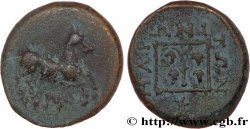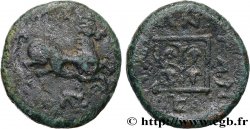bgr_451363 - THRACE - MARONEIA Statère
Not available.
Item sold on our e-shop (2017)
Price : 2 500.00 €
Item sold on our e-shop (2017)
Price : 2 500.00 €
Type : Statère
Date: c. 398/397-347/346 AC.
Mint name / Town : Maronée, Thrace
Metal : silver
Diameter : 22,5 mm
Orientation dies : 12 h.
Weight : 11,13 g.
Rarity : R2
Coments on the condition:
Exemplaire sur un flan bien centré des deux côtés. Très joli doit élancé. Revers de style fin. Magnifique patine de médaillier avec des reflets mordorés. Conserve la plus grande partie de son brillant de frappe et de son coupant d’origine
Catalogue references :
Predigree :
Cet exemplaire provient du stock de J. Vinchon, de la vente Parsy du 25 mars 1999, n° 58 et de la collection B. Odaert
Obverse
Obverse legend : ANÉPIGRAPHE.
Obverse description : Cheval libre galopant à gauche.
Reverse
Reverse description : Quatre grappes de raisin sur un cep de vigne dans un carré linéaire ; une cigale en fin de légende de revers.
Reverse legend : EPI/ COR/HG/O.
Reverse translation : (du magistrat Chorégo).
Commentary
Mêmes coins que l’exemplaire de la collection Löbbecke du musée de Berlin (Schönert-Geiss, p. 157, n° 437, pl. 20).








 Report a mistake
Report a mistake Print the page
Print the page Share my selection
Share my selection Ask a question
Ask a question Consign / sell
Consign / sell
 Full data
Full data



